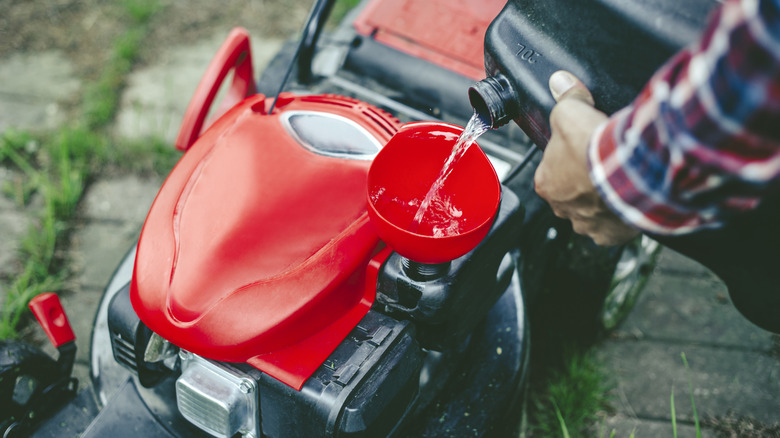The Pricey Reason Gas Shouldn't Sit In Your Lawn Mower (And When To Change It)
With so many lawn care tasks on your plate — mowing, edging, weeding, watering — it's easy to overlook something as simple as leftover gas in your mower. But ignoring old gas can quietly turn into a big (and expensive) problem. Gas left to sit too long in your lawn mower can break down, gunk up your engine, and eventually cause it to stall, misfire, or not start at all. When this happens, what seemed like a minor chore can end up costing you anywhere from $80 to over $100 on average in repairs, depending on the damage, plus the cost of labor, which tends to run from $45 to even $100 per hour. That's the kind of surprise no homeowner wants during peak mowing season.
The exact repair cost will vary based on the type of mower you have, the extent of the damage, and the complexity of fixing the issue. For example, if your lawn mower is leaking gas due to the leftover gas building up in the carburetor, you'd probably only have to pay $36 to $50 for a simple carburetor cleaning. Meanwhile, if the gas you let sit ends up indirectly causing a more serious issue like damaged gasket rubber, you might be looking at higher repair costs, ranging from $860 up to $2,700, as the engine would need to be replaced. When repair costs get higher than the lawn mower's value, it might not even be worth repairing — this is when it's time for a new lawn mower. But if shopping for new lawn equipment isn't on your priority list, there are simple precautions to help you avoid unnecessary purchases and costly repairs.
When you should change the gas in your lawn mower
The easiest way to dodge costly repairs is to simply not let gas sit too long. Gasoline may start breaking down in as little as 30 days, especially if it's ethanol-blended. So, if your mower has been sitting unused for more than a month, it's smart to drain the old gas and replace it with fresh gasoline that hasn't begun breaking down. This will help avoid gas residue building up in different parts of your mower and damaging its components, allowing you to mow your lawn whenever you need to without unwanted surprises.
For extra protection (or if you're just not feeling up to changing your fuel every month on the dot), using fuel stabilizer might be just what the doctor ordered. Fuel stabilizer's purpose for your lawn mower is an important one when it comes to holding off on changing gas — it slows down the degradation of gasoline, giving you more breathing room between gas changes. With this solution, you won't have to worry about gas residue wreaking havoc on your lawn mower (not to mention that it can save you a few bucks on eventual repairs).

